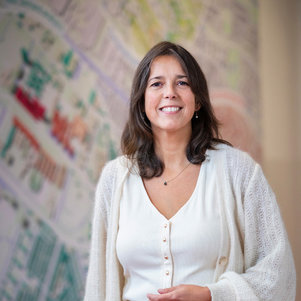Prof.dr. E.M. van Bueren
Professor of Urban Development Management - Department of Management in the Built Environment
Chair of Department of Management in the Built Environment
Ellen van Bueren is professor of Urban Development Management at the Faculty of Architecture and Built Environment. Urban Development Management focuses on the management of urban development and develops tangible concepts, tools and principles for an integrated area-specific approach to contemporary urban challenges.
Integrated area-specific approach to urban challenges
‘Balancing different interests is central to urban development. How do public and private parties, professionally organised or ‘bottom-up’, manage to create a pleasant, sustainable living environment? This question is central to the teaching and research of the chair in Urban Development Management.
These are exciting times for the city. Cities have to be the best in everything they do, with the mayor at the helm. But the mayor's control options are limited. The city takes shape through an interplay between government, market and society. The relationships within and between these groups are undergoing significant change. The government is handing over certain responsibilities. The limitations of market forces are becoming apparent. Whether out of sheer necessity or voluntarily, the citizen is becoming increasing more self-reliant. Traditional players in urban development, such as real-estate developers and housing corporations, have insufficient funds or powers to initiate and shape major developments.
Today, growth is often no longer the driving force behind urban development in our European cities. Urban development is more the result of adaptation to new needs in society and to the consequences of climate change and technological innovation, such as in the fields of energy, water, climate, healthcare and related infrastructures.
Developments often take place at different levels than the city or urban area. Some might seem on a small-scale, such as installing solar panels on a roof or buying an electric car. But all these small-scale developments together influence developments on higher levels: our whole energy system is going through a major overhaul, which in turn will affect the city, the buildings and the users. Other developments, on the other hand, take place at higher levels. The European objectives with regard to CO2 emissions, renewable energy and water quality, for example, were formulated centrally, although they must be achieved at regional level.
Managing and influencing these developments is complex. They are the result of decisions taken by multiple actors at various administrative and spatial levels, who do not always ensure there is a harmonised approach to these developments. The developments are also highly context-related: each field has its own unique combination of physical, technological and social features. In addition, urban development is also influenced by regional, national and global developments, which are sometimes contradictory.
Gaining insight in these processes of change and ways in which to manage them forms the core of the chair in Urban Development Management (UDM). Urban development management requires contextual and area-conscious approaches, through which the opportunities for improvement in a given urban area are identified and utilised.
In Northwest Europe, including the Netherlands, an integrated, area-specific approach to urban challenges has been developed, which is arousing the interest of academics and practitioners around the world, both in terms of process and results. Currently, this approach is seen as a promising approach in finding solutions for the most pressing urban issues of today, such as in the field of healthcare, energy, food, mobility and water. The enormous challenges in urban areas means that it is important from a scientific and social perspective to research the way in which an integrated, area-specific approach to urban challenges must be understood and can be effectively implemented. And it is also important to compare this approach to that of urban areas in other parts of the world, so that they can enhance each other.’
Administration and management of sustainable urban development
Throughout her career, which started out at an urban-planning firm, Van Bueren has been inspired by her interest for the administration, management and governance of sustainable urban development. She often balances developing knowledge with actual practice. She is the author of scientific articles and books, is on the editorial boards of journals in the field of public administration and urban development and teaches in various programmes for students and professionals, including the Master City Developer. She is a board member of the Leiden-Delft-Erasmus Centre for Sustainability and Principal Investigator at AMS, Institute for Advanced Metropolitan Solutions.

Ellen van Bueren
- +31 15 27 84515
- E.M.vanBueren@tudelft.nl
-
Room B8-01.West.700